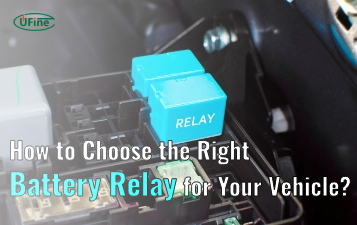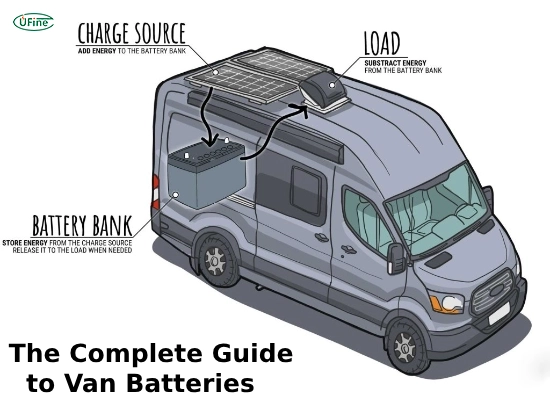Van batteries are essential for keeping your van running smoothly. This guide will help you understand everything about van batteries. You’ll learn what they are, the different types, and how to choose the best one. Plus, we’ll share tips on maintenance and solving common issues.
Part 1. What is a van battery?
A van battery is a device that stores and supplies electrical energy to your van. It powers the starter motor, lights, and other electronic components. There are different types of van batteries, like lead-acid, AGM (Absorbent Glass Mat), and lithium-ion. Lead-acid batteries are the most common. They have been around for a long time. AGM batteries are more advanced and last longer. Lithium-ion batteries are the newest. They are lightweight and have a high energy density. Each type has its benefits and drawbacks.
Importance of a High-Quality Battery for Vans
A high-quality van battery is crucial for many reasons:
- Reliability: A good battery ensures your van starts every time. You want to avoid getting stuck with a dead battery, especially in bad weather or in the middle of nowhere.
- Performance: High-quality batteries provide stable power to all the van’s systems. This includes lights, radio, GPS, and other electronic devices. This ensures everything works properly.
- Longevity: Quality batteries last longer. They can handle more charge and discharge cycles. You will have to replace them less often, saving you money in the long run.
- Safety: A good battery reduces the risk of leaks and corrosion. Poor-quality batteries can leak acid, damaging your van and harming you.
- Efficiency: High-quality batteries charge faster and hold their charge longer. This is important if you use many electronic devices in your van.
Part 2. Types of van batteries
When choosing a van battery, knowing the different types available is essential. Each type has unique features and benefits. Let’s look at the main types of van batteries: lead-acid, AGM (Absorbent Glass Mat), and lithium-ion.
Lead-Acid Batteries
Lead-acid batteries are the most common type used in vans. They have been around for over 150 years and are reliable and cost-effective.
- Flooded Lead-Acid: These are the traditional batteries. They have removable caps for adding water. They are affordable but require regular maintenance.
- Sealed Lead-Acid: Also known as maintenance-free batteries. They don’t need water and have a sealed design to prevent leaks. They are slightly more expensive than flooded types.
AGM (Absorbent Glass Mat) Batteries
AGM batteries are more advanced than lead-acid batteries. They use a special glass mat to absorb the electrolyte. This makes them spill-proof and more durable.
- Longer Lifespan: AGM batteries last longer than traditional lead-acid batteries. They can handle more charge and discharge cycles.
- Higher Performance: They provide better performance, especially in extreme weather. They are also more vibration-resistant, making them ideal for vans that drive on rough roads.
- Low Maintenance: AGM batteries require little to no maintenance since their design prevents leaks. This makes them convenient for busy van owners.
Lithium-Ion Batteries
Lithium-ion batteries are the newest type of van batteries. They are lightweight and have a high energy density.
- Lightweight: Lithium-ion batteries weigh less than lead-acid and AGM batteries. This helps improve your van’s fuel efficiency.
- Fast Charging: They charge faster than other types of batteries. This is great if you need to recharge your battery quickly on the go.
- Longer Lifespan: Lithium-ion batteries have the most extended lifespan. They can last several years with proper care.
- High Cost: They are more expensive than lead-acid and AGM batteries. However, their long lifespan and low maintenance can make them a cost-effective choice in the long run.
Part 3. Key factors to consider when choosing a van battery
When choosing a van battery, it’s essential to think about several vital factors. These factors will help you pick the best battery for your needs.
Battery Size
Ensure the battery fits your van’s battery tray. Check the owner’s manual for the correct size. Using the wrong size can cause problems.
Capacity (Ah)
Look for a battery with a suitable capacity, measured in ampere-hours (Ah). Higher Ah means the battery can power your van’s electronics longer.
Cold Cranking Amps (CCA)
Check the CCA rating, especially if you live in a cold climate. Higher CCA means the battery can start the van better in cold weather.
Reserve Capacity (RC)
RC indicates how long the battery can run your van if the alternator fails. A higher RC is better for emergencies.
Maintenance
Consider how much maintenance the battery needs. Some batteries need regular water refills, while others are maintenance-free.
Lifespan
Look for a battery with a long lifespan. AGM and lithium-ion batteries usually last longer than traditional lead-acid ones.
Warranty
Choose a battery with a good warranty. A more extended warranty gives you peace of mind and protection against defects.
Price
Balance your budget with the battery’s features. Spending more on a quality battery can save you money in the long run.
Compatibility with Van Electronics
Make sure the battery supports all your van’s electronic devices. This includes lights, radio, GPS, and any additional gadgets you use.
Brand Reputation
Consider batteries from reputable brands. Trusted brands often offer better quality and customer support.
Part 4. Maintenance tips for van batteries
Proper maintenance of your van battery is essential to ensure longevity and reliable performance. Here are some practical tips to keep your van battery in top condition:
- Regular Inspections: Check your battery for signs of corrosion, leaks, or damage. Catching issues early can prevent more severe problems.
- Clean Battery Terminals: Clean the battery terminals and cable connections regularly. Use baking soda and water to remove corrosion and ensure good electrical contact.
- Check Fluid Levels (for Flooded Batteries): If you have a flooded lead-acid battery, check the fluid levels regularly. Add distilled water to maintain proper levels, but do not overfill.
- Secure Battery Hold-Down: Ensure you securely hold the battery to prevent damage from vibrations while driving.
- Avoid Deep Discharges: Try to avoid letting your battery fully discharge. This can shorten its lifespan. If your battery repeatedly discharges deeply, consider getting a battery with a higher capacity.
- Keep It Charged: If your van sits unused for long periods, consider using a battery maintainer or trickle charger to keep the battery charged. This prevents it from draining completely.
- Protect from Extreme Temperatures: Extreme heat or cold can affect battery performance. Park your van in a garage or shaded area to minimize temperature extremes.
- Use Electronics Wisely: Limit electronics (like lights or radio) when the engine is off to avoid unnecessarily draining the battery.
- Inspect for Signs of Wear: Inspect the battery casing for cracks or bulges, which can indicate internal damage.
Part 5. Common issues with van batteries and troubleshooting tips
Van batteries can face several common issues that affect their performance. Here are some of the most frequent problems and how you can troubleshoot them:
Battery Not Holding Charge:
- Issue: Your van battery may not hold a charge, leading to difficulty starting the engine.
- Troubleshooting: Check the battery terminals for corrosion and clean them if necessary. Test the battery voltage with a multimeter to ensure it’s within the recommended range. If the battery is old or damaged, consider replacing it.
Corrosion on Battery Terminals:
- Issue: Corrosion can build up on the battery terminals over time, affecting electrical conductivity.
- Troubleshooting: Clean the battery terminals with baking soda and water to remove corrosion. Use a wire brush to scrub off any remaining residue. Apply a small amount of petroleum jelly or terminal protectant to prevent future corrosion.
Slow Cranking or Difficulty Starting:
- Issue: If your van cranks slowly or has difficulty starting, it could indicate a weak battery or poor electrical connection.
- Troubleshooting: Check the battery cables and terminals for tightness and corrosion. Ensure all connections are secure. If the terminals are clean and tight but the problem persists, have the battery tested for capacity and CCA (Cold Cranking Amps). Replace the battery if necessary.
Battery Overheating:
- Issue: Overcharging, excessive electrical loads, or internal faults can cause batteries to overheat.
- Troubleshooting: Check the charging system voltage when the engine is running. It should be within the manufacturer’s recommended range. Reduce electrical loads if possible. If the battery continues to overheat, have the charging system inspected by a professional mechanic.
Battery Drainage When Parked:
- Issue: Your van’s battery may quickly drain when parked, even if you turn off everything.
- Troubleshooting: Check for parasitic drains by disconnecting one battery terminal and using a multimeter to measure current flow. If there’s a significant current draw, remove fuses individually to identify the circuit causing the drain. Address the underlying issue, such as a faulty component or wiring problem.
Physical Damage to the Battery:
- Issue: Physical damage, such as cracks or bulges in the battery casing, can lead to leaks or internal shorts.
- Troubleshooting: Inspect the battery casing for signs of damage. If you find damage, replace the battery immediately to prevent safety hazards and further damage to your van’s electrical system.
Electrolyte Levels (for Flooded Batteries):
- Issue: Low electrolyte levels can affect battery performance if you have a flooded lead-acid battery.
- Troubleshooting: Check the electrolyte levels and add distilled water if necessary, following the manufacturer’s recommendations. Avoid overfilling. If the electrolyte levels are consistently low, there may be a leak, or the battery may be nearing the end of its lifespan.
Part 6. FAQs
-
Can I jump-start my van battery with another vehicle?
You can jump-start your van using jumper cables and another vehicle with a charged battery. Ensure you turn off both cars before connecting the wires. -
How often should I replace my van battery?
The lifespan of a van battery varies depending on the type and usage. Generally, lead-acid batteries last 3-5 years, AGM batteries around 4-7 years, and lithium-ion batteries up to 10 years. Replace your battery when it no longer holds a charge or shows deterioration. -
Is it necessary to disconnect the battery when my van is not in use for a long time?
Suppose you will park your van for an extended period. In that case, it’s advisable to disconnect the negative battery terminal to prevent parasitic drain. Alternatively, you can use a battery maintainer or trickle charger to keep the battery charged. -
Can extreme temperatures affect my van battery?
Yes, extreme heat or cold can impact battery performance. Park your van in a garage or shaded area to minimize temperature fluctuations. Consider using a battery blanket in cold weather to maintain optimal operating conditions.
Related Tags:
More Articles

How to Choose the Right Battery Relay for Your Vehicle?
Choosing the right battery relay ensures optimal performance. This article explores key factors and answers common questions for selecting a reliable relay.
What to Know Before Buying a Riding Mower Battery
Ready to buy a riding mower battery? Learn the key factors to consider. Discover what you need to choose the best battery today!
Understanding Battery Relay: A Comprehensive Guide
Battery relays are essential for managing power efficiently. This guide covers their functions, types, and applications for DIY enthusiasts and vehicle owners.
12V STD vs. 12V AGM: Which Battery Is Right for You?
Learn the differences between STD and AGM batteries. Make an informed decision for your next battery purchase. Read more here!
How Much Does a Deep Cycle Battery Weigh?
Curious about deep cycle battery weights? Find out how much they weigh and get helpful tips for selecting the best battery for your projects!




